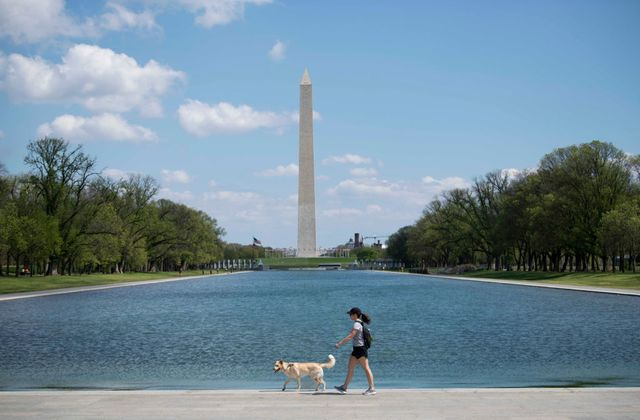CUA Plans for the Spring: “Determined” to Reopen, but Plenty of Unknowns Remain

Image courtesy of Xinhua/Liu Jie via Getty Images
By Shannon Rose Miekka
As Catholic University rounds the corner of a wild semester, there is one question on everyone’s mind: what are CUA’s plans for the spring?
Several schools have already made the decision to go online for the upcoming semester. Most notably, D.C.’s own George Washington University announced on October 9th that their spring semester will be entirely virtual. It is worth noting that CUA announced its Fall 2020 plan within a week of neighboring D.C. schools’ decisions— including George Washington, American, and Georgetown— to conduct the fall semester remotely.
The administration and President John Garvey have made it clear that they are determined to reopen campus in the spring. However, no one can know for certain if this will change as 2021 approaches. For now, the CUA community is left to wonder: How will we learn, where will we live, and when will we know?
Here’s what we do know: CUA announced on Tuesday that the start date for next semester will move from January 11 to January 25. In addition, the administration decided to eliminate spring break in order to minimize public health risks.
“By Thanksgiving we will have more detailed information on next semester’s academic offerings,” wrote Garvey in his most recent COVID-19 update.
As of now, there are essentially two scenarios for the spring: either CUA reopens or it doesn’t.
Scenario 1: If campus does (at least partially) reopen
“Our plan is to be as open as possible,” said President Garvey at the Town Hall for the Class of 2022 held by SGA on October 26th.
Who will be allowed to live on campus?
Many students are wondering who will be the lucky ones allowed to return, if the school can offer only limited housing. It seems clear that those who live on campus now will continue to have housing in the spring, but who will join them?
According to Director of Residence Life Amy Kerr, there are 617 students living on campus, composed of mostly freshmen and some student leaders. On October 1st, the school sent out a Spring 2021 Housing Interest Form, in order to gauge interest in on-campus housing, should the opportunity become available.
“I think we had 578 students who volunteered or expressed an interest in taking rooms in the spring,” said Garvey at the October 26th Town Hall. “Of those, maybe 140 were juniors, another 100 were seniors, and 300 plus were sophomores.”
At September 30th’s Town Hall for the Class of 2021, Garvey was asked whether the senior class would be prioritized next semester.
“I get asked this question a lot and I always say ‘yes,’” Garvey answered. “If we are able to open, and I am determined that we will be able to, I think we would give the seniors priority because of how bad I felt about last year’s seniors.”
He echoed the same sentiment at the Town Hall for the Class of 2022.
SGA President Gerald Sharpe asked, “Will juniors be allowed to come back for in person classes, and/or the opportunity to live in our residence halls?”
“The answer to both is yes, I think,” replied Garvey.
How much room (and how many rooms) will be available?
In an ordinary year, there are 1,984 beds on campus. According to Vice President of Student Affairs Judi Biggs Garbuio, with one person per bedroom and all the floors filled, the school has space for a maximum of 1,172 students to live on campus.
As of now, the plan is for freshmen to stay in their current housing, like Opus, while upperclassmen will be assigned to the “traditional” community residence halls, such as Reagan, Ryan, and Flather.
“We moved the first year students into our suites and apartment style living,” says Biggs-Garbuio. “Because the first year communities have been established, it would be really difficult for them to be redistributed throughout the campus community.”
What about the students who can’t return?
Should the school reopen, there will certainly be some students who either are unable to or choose not to attend in-person classes.
“Individual students who are uncomfortable or unable to return to campus to complete their degree are expected to be able to complete their degree remotely, as of now,” said Garvey.
There’s also the matter of tuition discounts. Will students who are not allowed on campus next semester— or unable to return due to the virus— receive another tuition decrease?
Garvey answered, “We’re determined that people are going to be allowed on campus this spring, so that’s a question we don’t want to face.”
Let’s talk about classes.
The school is taking extra measures to make in-person learning safe and possible in the spring, yet some uncertainties remain until the next semester is confirmed. In the meantime, students may notice when they register for spring classes that a majority of courses on Cardinal Station are listed as “Online” rather than “In-Person” or “Synchronous Remote.”
Even if the school reopens and adds more in-person classes this spring, several faculty members are still concerned about the notion of returning to campus.
“I liked my profession – heck, I liked my life – before the pandemic. I want it back,” wrote one faculty member on the Faculty Assembly Discussion Board. “But I am not teaching in person until I am vaccinated and ideally many of my students are as well.”
Scenario 2: If the school does not reopen
Unfortunately, despite all of the school’s precautions to have a safe reopening, the disappointing reality is that there is no certainty when it comes to coronavirus.
When will we know?
Several students have asked for a timeline when the university expects to release its decision on the spring semester.
“How can we trust that you are going to open in-person classes and buildings, since you said the same thing during summer then blindsided us this fall last minute?” asked one student anonymously at the Monday’s event.
Garvey chuckled, “Fair enough.” He continued, “I can understand how difficult it has been for our students and families to hear on July 31st that we’re not opening. We waited as long as we did because we were determined and very much hopeful that we’d be able to meet in person for our classes and on campus for our students who wanted to live here… What we’ve heard from students since then has indicated to us that you all feel the same way.”
TL;DR?
All in all, President Garvey and the administration seem confident that Scenario 1 is not only possible but probable, leaving the CUA community concerned that we will be unprepared for Scenario 2. If the university cannot open any further, hopefully the decision is announced sooner rather than later. Otherwise, the students, faculty, and families will feel yanked around, left to find living and learning arrangements with little warning.
“People will ask me how I can be so optimistic that we’re going to be able to open and I say I’m not optimistic, I’m resolute,” said Garvey on September 30th. “I’m just determined that we should be able to open in the spring.”







